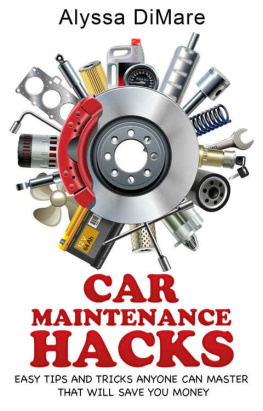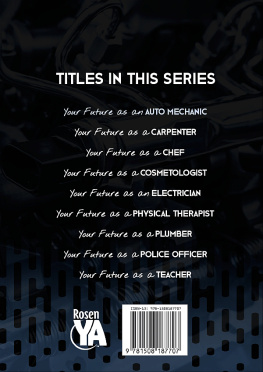Car Maintenance Hacks
Easy Tips & Tricks Anyone Can Master that will Save You Money
By: Alyssa DiMare
Copyright 2016 Alyssa DiMare. All Rights Reserved.
Disclaimer
The methods describe within this eBook are the authors personal thoughts. They are not intended to be a definitive set of instructions for this project. You may discover there are other methods and materials to accomplish the same end result.
The information provided within this eBook is for general informational purposes only. While we try to keep the information up-to-date and correct, there are no representations or warranties, express or implied, about the completeness, accuracy, reliability, suitability or availability with respect to the information, products, services, or related graphics contained in this eBook for any purpose. Any use of this information is at your own risk.
The author has made every effort to ensure the accuracy of the information within this book was correct at time of publication. The author does not assume and hereby disclaims any liability to any party for any loss, damage, or disruption caused by errors or omissions, whether such errors or omissions result from accident, negligence, or any other cause.
Dedicated to my Father who never let
me leave the house without first checking
my tires.
Chapters
Introduction
1. Tips for Everyday Maintenance
2. The Know How: Oil/Engine
3. Alive or Dead: Your Battery
4. Keep Me Rolling: Tire and Brake Tips
5. When Your Car Wont Start
6. Knowing the Difference: Car Fluids
7. Dashboard Lights and Gauges
8. Headlights, Blinkers, and Brake lights
9. Fuses, Filters and Spark Plugs
Bonus Chapter: Car Survival Kit
Introduction
Are you a skilled auto mechanic? Not many of us are. This short guide is designed to help you help your car. By following the simple steps in this book you can remedy your car troubles before they become monsters, achieve long-term efficiency for your car and learn some simple fixes that will get you to the next destination.
Keeping your car in the best condition possible is important not only for the life of your car, but more importantly for your wallet. Think of it like this: If a tree needs water and you dont water, it will eventually die. However if you water it the minute you notice drooping you will probably save its life. The same goes for your car. The minute you notice something is wrong, its best to get it fixed and pay a small price upfront rather than letting the problem expand along with the cost needed to fix it.
Your car has many moving parts that must work together as a whole. If one part is damaged, the rest of the car will eventually become damaged while overcompensating for the original problem part.
Most of us are not mechanics and when a problem arises, we either spend money to have someone look at the problem or we ignore the problem until it becomes unmanageable. This book you will help you to find a happy medium between these two options. It will also help you to get in the habit of checking on your car every so often, discerning between normal and abnormal noises, answer simple questions answered, as well as learn a bit about how your car works.
When you are finished reading, I hope that youll use these tips and tricks to expand the longevity of your vehicle. Remember, our vehicles can only take good care of us if we take good care of them first.
Chapter 1: Tips for Everyday Maintenance
These are simple tasks that can be done while youre getting gas or have a moment before starting your drive. They might save you from an accident or simply let you know its time to take your car in. Either way catching the problem early on will allow you to prepare for necessary fixes, before its too late.
Things to do often:
1. Check the tires
This is one of the most important things you can do, and its an easy one too! Make sure to look at your tires on a regular basis. Tires wear out and cause accidents more than any other malfunction, so check for low air or wearing of the rubber. After you inspect them a few times, youll develop a good idea of what to look for.
2. Check your fluids
Windshield wiper fluid should be full, oil should be a good color (light golden brown) and coolant should be at the correct level.
*Important note: always check coolant with the car off and cooled down. The pressure in the tank can cause injury if you take the cap off too quickly.
3. Always use the correct gas
When you pop the cover to fill up on gas, most new cars will have a label stating which gas is supposed to be in the tank. Even though it can be expensive, using the correct gas can save your car from damage in the long run, like a bad fuel pump or poor gas mileage.
Check your lights
Periodically make sure brake lights, headlights and blinkers are all working properly. Your lights are your communication with other drivers, which is why you are legally required to keep them in good working order. Maintaining your lights can keep you safe, and also save you from getting tickets!
*Quick tip if there is no one around to help check the lights, use the reflection of a store window or a wall to see the glow.
5. Try not to run the car on empty over and over again
This causes the fuel pump to go bad at a quicker pace. Why? Because when you run the car on empty, the pump sucks up the garbage and gunk at the bottom of the tank, which in turn makes the pump go bad.
6. Wash Your Car
How can washing your car keep it running longer? Its simple, the more familiar you are with your car, inside and out, the more likely you are to notice a problem right away. While washing your car you might notice things like loose hubcaps, failing windshield wipers, or loose molding near doors. Fixing little things like this will lead to less distractions while driving (imagine a hubcap flying off on the highway!), and will increase the re-sale value of your car. Polish your headlights, and the plastic accents on your car. Why not? Additionally, road grime and salt should be washed away as soon as possible as it will damage your car over time. See below.
Other environmental tips:
1. Wash the undercarriage
This is something you dont always think about because its underneath car, but this is important if you live in a city near the ocean or in the winter time when there are massive amounts of salt on the road. Salt erodes metal and eventually causes deterioration of your undercarriage. By washing the bottom of your car regularly in these conditions youll be saving yourself money in the long run. With a pressure hose or regular hose, give the underside of your car a quick spray down to wash away excess salts sticking to the metal. If youre at a drive through car wash, splurge and spend that extra dollar to get the undercarriage washed. Your car will thank you later.
2. Icy windshields
If you live a place where it snows a lot, instead of struggling with an ice scraper or having to warm your car for at least 20 minutes, throw a sheet/towel or blanket on the windshield before you go to bed at night. This keeps the ice or snow from falling onto your windshield. In the morning, take it off and throw it in the garage or the trunk! No more winter struggle or letting the car idle in the driveway for a long time. This is a win-win for you and the environment, because studies show that idling cars are terrible for our air quality.
Tips for finding a good mechanic
Ask around! If someone uses a good mechanic they would be happy to tell you!
Check out Yelp or other online forums. The reviews will let you know whether or not the mechanic is trustful and fair.
At the very least, call around to get different estimates on the work before allowing your first choice to continue working on your car. Getting estimates will let you determine if the mechanic is trying to rip you off or is giving you a fair price for the work required.
Next page








